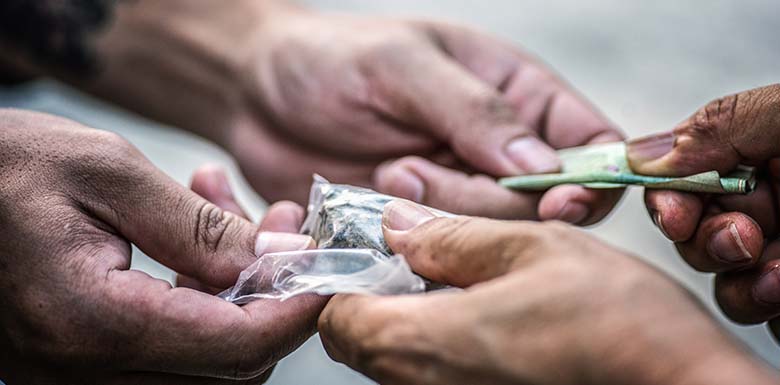How to Defend Against Possession With Intent to Sell Charges in Tampa, FL?

Law enforcement may charge you with intent to sell drugs if the circumstances of your arrest show you wanted to sell drugs, not use them.
The prosecution has the burden of proving beyond a reasonable doubt what you were thinking at the time of your arrest. Their success in proving this depends on the evidence. With the help of a skilled drug possession defense lawyer in Tampa, you stand a better chance at beating the charges.
What is Possession With Intent to Sell Controlled Substances?
Florida statute bans possession with intent to sell controlled substances, which include legitimate drugs handled illegally and illegal drugs. Additionally, the statute makes it a criminal act if you’re doing so within a certain distance of several places at specific times.
Florida Statute, Chapter 893.13(a) states in part, “…a person may not…possess with intent to sell…a controlled substance.”
Does the Time & Location Impact Your Charges?
If you are arrested for possession with intent to sell, the police will definitely check your surroundings. Your intent to sell charges worsen if there is evidence that suggests the crime was committed on, or within, 1,000 feet of:
- A child care facility
- An elementary, middle, or secondary school between the times of 6 a.m. to midnight
- A state, county, or municipal park
- A community center
- A publicly owned recreational facility
- A university, college, or other postsecondary educational institution
- A physical place for worship where a church or religious organization regularly conducts religious services
- A convenience business
- A public housing facility
- An assisted living facility
What Are the Penalties for Possession with Intent to Sell Drugs?
The statute refers to other parts of Florida law that describe different illegal drugs. Depending on the type and quantity involved, the offense could be a first, second, or third-degree felony or a first-degree misdemeanor.
The maximum prison sentence for these crimes ranges from one to 30 years. Maximum fines can be from $1,000 to $10,000. One of the factors in determining your intent to sell drugs is the amount found. Based on what type of drug it is and how much, you may face a mandatory minimum sentence of three to 25 years and a fine from $50,000 to $250,000.
How Do Intent to Sell Charges Often Occur?
These charges often arise after the following:
- Pat-down searches
- Vehicle searches during a traffic stop
- Police surveil an area of suspected deal dealing
- An informant (usually trying to get out of their drug charges) tells officers of others dealing drugs
What Evidence Could Prosecutors Use Against You?
A jury infers your intent based on evidence produced at trial. The defense can prevent this evidence from being used; however, the judge makes the final decision, though it could be appealed.
After it’s introduced, the defense can challenge the accuracy or trustworthiness of the presented evidence and further exploit weaknesses in the prosecution’s case.
Examples of evidence that could be used against you include:
Your Own Words
You may have been recorded by a police officer or informant making damaging statements. Further, the police could have obtained a warrant and monitored your communications. You also may have incriminated yourself by ignoring your right to remain silent.
Photos or Videos
Surveillance videos or photos may show you selling drugs or circumstantial evidence that it happened. Police surveillance may show you meet several people who walk away with small packages. It could also show many people going in and out of a room or building where you’re located.
Witness Testimony
Witnesses and those buying from you could testify you had illegal drugs and were selling them.
The Amount or Type of Drugs Allegedly in Your Possession
The prosecution may suggest that the amount or type of drugs you were found with wouldn’t usually be for personal consumption.
How the Drugs Were Packaged
The drugs in question may have been found in small packages. This could suggest that the drugs were intended to be distributed to multiple people.
Other Obtained Materials from the Scene
Other items obtained at the scene, such as a scale, empty baggies, packages, vials, or even a gun, could be used to support the claim that you intended to sell drugs. Additionally, large amounts of cash make it look like you’re selling something.
What Defenses Could You Use?
Defenses to possession with intent to sell illegal drugs depend on the facts of your case and applicable law. The following defenses that may be available to you include:
- Illegal search and seizure
- The drugs were not legally in your possession
- Mistaken identity
- Issues with the chain of custody
- Entrapment
Not all these defenses may apply. However, upon further investigation, we will determine the best strategy.
Contact a Criminal Defense Attorney in Tampa
You need an experienced Tampa criminal defense attorney to advocate for your innocence if you face a serious drug charge. Metcalf Falls, Criminal Defense Attorneys, P.A., may help you avoid harsh penalties and allow you to put this behind you.
Call our office at 813-258-4800 to schedule your free, no-risk consultation, or use our quick contact form, and we’ll contact you.
